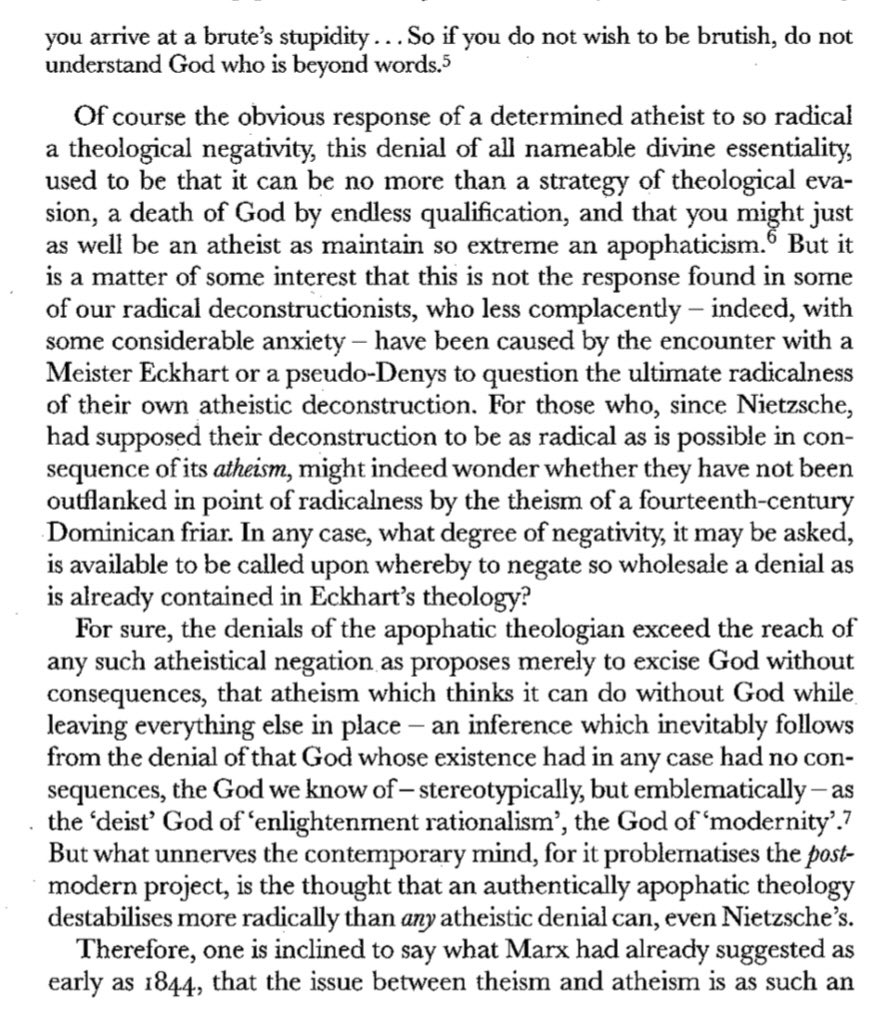
Catholic Theocrat | philosopher | freetimer | essayist | church musician |
How to get URL link on X (Twitter) App




 “[It] is a matter of some interest that […] some of our radical deconstructionists [with considerable anxiety] have been caused by the encounter with a Meister Eckhart or a pseudo-Denys to question the ultimate radicalness of their own atheistic deconstruction.”
“[It] is a matter of some interest that […] some of our radical deconstructionists [with considerable anxiety] have been caused by the encounter with a Meister Eckhart or a pseudo-Denys to question the ultimate radicalness of their own atheistic deconstruction.”


 Cf. Denys Turner:
Cf. Denys Turner: https://twitter.com/maestrojmc/status/1622091406574768128


 …an icon of the logos as a whole, and precisely for this reason the evidence it possesses and radiates is absolute, for this evidence cannot be obscured by any comparison to the original.”
…an icon of the logos as a whole, and precisely for this reason the evidence it possesses and radiates is absolute, for this evidence cannot be obscured by any comparison to the original.”



 …from which it draws all possible names for “God” or “the Absolute.” What Hegel/Kojève have thus honed upon is the cataphatic side of theology, but severed from its dialectical partner: the apophatic, which represents the silence into which discourse falls after it traverses…
…from which it draws all possible names for “God” or “the Absolute.” What Hegel/Kojève have thus honed upon is the cataphatic side of theology, but severed from its dialectical partner: the apophatic, which represents the silence into which discourse falls after it traverses…

 Nietzsche says somewhere that Christianity is the religion of women as well as slaves, and where derides it for this reason, it seems that Kojève would regard this as Christianity’s greatest strength.
Nietzsche says somewhere that Christianity is the religion of women as well as slaves, and where derides it for this reason, it seems that Kojève would regard this as Christianity’s greatest strength.

 …resembling the Aristotelian notion of “potentia” (δύναμις) — and therefore still confined to the realm of thought or consciousness; and therefore not the true ground of consciousness, which must be a “true” and “oppositionless” nothing, i.e. not a nothing that is only defined…
…resembling the Aristotelian notion of “potentia” (δύναμις) — and therefore still confined to the realm of thought or consciousness; and therefore not the true ground of consciousness, which must be a “true” and “oppositionless” nothing, i.e. not a nothing that is only defined…

 Notice how the circumstance of a confessional state shows up in this paragraph: “civil recognition is given to one religious community in the constitutional order of society.” This is not repudiated; rather, the duties of the state towards *other* religions are simply delineated.
Notice how the circumstance of a confessional state shows up in this paragraph: “civil recognition is given to one religious community in the constitutional order of society.” This is not repudiated; rather, the duties of the state towards *other* religions are simply delineated.

https://twitter.com/Hasan22821492/status/1455759831298678792One among many fascinating clips. I’ll be returning to this a lot…



 St. Thomas's commentary. What is striking is how the distinction and multiplicity of all the types of motion are denied of God, only to be attributed to him in a transcendently unified way: what in creatures is distinct and multiple is unified and identical in God.
St. Thomas's commentary. What is striking is how the distinction and multiplicity of all the types of motion are denied of God, only to be attributed to him in a transcendently unified way: what in creatures is distinct and multiple is unified and identical in God. 




https://twitter.com/maestrojmc/status/1284216737081126912Pope Benedict, in Spe Salvi, has what I think is the best critique of Marx that any pope (even JPII) has put forward.

